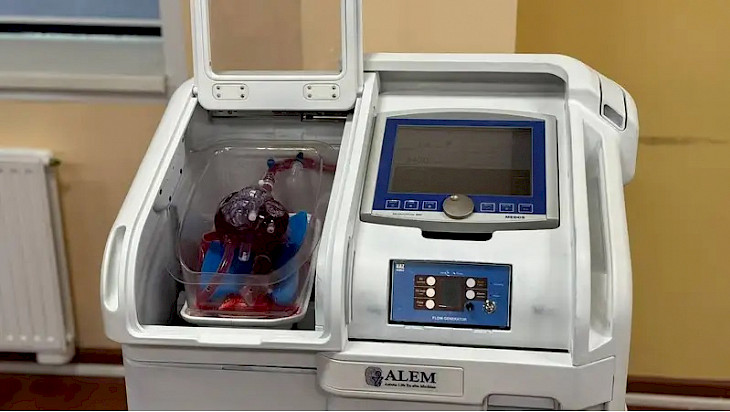A team of medical doctors from the capital of Kazakhstan, Astana, has created a unique device for the prolonged transportation and treatment of donor organs outside the body, Zakon.kz reports.
Doctors from the National Scientific Cardiac Surgery Center of Kazakhstan introduced a unique device called ALEM (Astana Life Ex-situ Machine). This apparatus will allow for the extended transportation and treatment of donor organs outside the body, and there are currently no analogs.
Since the beginning of transplantology history in Kazakhstan, doctors had been using an American device for transporting donor organs. However, its capabilities did not meet the requirements, and its usage turned out to be too costly. Until recently, the world believed that a donor heart could only be transported for four to six hours, after which it becomes unsuitable for transplantation. However, doctors from the National Scientific Cardiac Surgery Center managed to overcome this time limitation and set a world record.
"This is a system for preserving and treating donor organs, allowing the organ to be preserved for an extended period—more than 24 hours. Within this time frame, necessary procedures or operations, such as heart or lung transplantation, can be performed. Also, during this time, it can be determined whether the organ is suitable for transplantation based on specific parameters," said Yuri Pya, Chairman of the Board of the University Medical Center and a cardiothoracic surgeon.
Timur Lesbekov, Director of the Clinical Academic Department of Cardiothoracic Surgery at UMC, sadly mentions the global statistics - 70% of offered donor hearts are discarded due to exceeding the delivery time of the organ.
"For various reasons, the organ may be unsuitable and impossible to treat. Moreover, if the heart is kept on ice, it cannot be treated. This technique is designed to eliminate both reasons to expand the pool of donors and organ availability," explained Timur Lesbekov.
The prospects for the ALEM device are extensive and already extend beyond transplantology to surgery, oncology, and perfusionology. The system's concept will allow the rescue of, for example, traumatically amputated limbs by connecting them to this system for prolonged transport to the hospital for replantation.
At present, according to Yuri Pya, there is no equivalent to the device globally because "the apparatus includes unique components, entirely developed by our doctors."
Clinical trials and production launch are expected for the project in 2024.
CentralasianLIGHT.org
January 10, 2024

